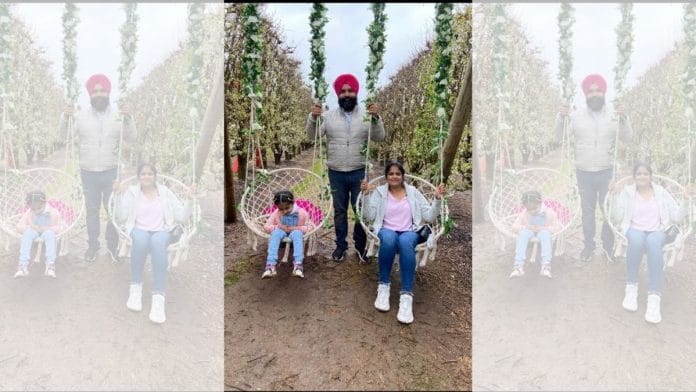New Delhi: When 37-year-old IT professional Gurpreet Singh, a permanent resident of Australia, came to attend his father’s funeral in Punjab’s Nawanshahr on 15 April, he thought it would be a short trip. However, since Australia Monday banned all travellers from India into the country till 15 May, Singh has not been able to return home to Perth.
The Australian government has come under pressure to reverse a travel ban, which came into effect Monday. The ban includes a five-year jail term or a hefty fine of up to 66,000 Australian dollars or both for those entering Australia after having been in India within the past 14 days of their arrival.
India has been battling a second Covid wave and according to the Australian government, the ban was needed to ease pressure on the country’s quarantine systems.
“It’s a very stressful time. I’ve lost my father and I want to return to my pregnant wife and toddler in Perth. My wife is seven months pregnant, and it’s difficult for her to run the house alone,” Singh told ThePrint over phone. He is one of an estimated 9,000 Australians currently in India.
The Australian High Commission in New Delhi has said it remains fully operational and ready to provide support to Australians in India.
However, the ban marks the first time Australians have been criminalised for returning to their country and the UN Human Rights Committee raised “serious concerns” about it Wednesday.
On Tuesday, Australian Prime Minister Scott Morrison claimed it is “highly unlikely” that Australians returning from India will be jailed, amid accusations that the ban is racist.
Former Australian cricketer and commentator Michael Slater, who was part of the now-cancelled IPL tournament, made headlines Monday when he accused Morrison of having “blood on his hands”.
Since the pandemic began in March 2020, Australia has closed its borders to all non-citizens and non-residents. It has been permitting limited international arrivals in recent months, mainly of its citizens returning from abroad. The country has an air transit bubble with neighbour New Zealand.
Last week, Australia decided to send a support package of oxygen, ventilators and personal protective equipment (PPE) to India to help battle the Covid crisis in the country. But Australian-Indians stuck in India owing to the travel ban, and separated from their families back home, feel “abandoned” and treated “differentially”.
Also read: US study shows how domestic travel ban to check Covid can lead to more cases, cites India data
‘Govt treating us like criminals’
The ban impacted almost 500 people who were meant to fly aboard two passenger flights into Sydney and two repatriation flights to Darwin.
According to Jomet Mani, an Indian-Australian running a migration consulting company in Melbourne, tickets for these flights were getting sold out “within seconds”.
“It was very difficult to get those tickets. They were being sold so quickly. Then the ban was imposed and made it all the more bleak,” Mani told ThePrint over phone. “My wife also got Covid in March this year. It’s been hard on us” he added.
Mani, originally from Kerala, has been stuck in Kottayam with his family of four since the pandemic began.
Flights to Australia with layovers are also off limits because the embarkation points at Dubai, Singapore, Kuala Lumpur and Doha are shut to flights from India.
According to reports, Australian cricketers who were part of the cancelled IPL tournament are expected to go to Maldives, before taking a connecting flight home. Last Friday, Australian cricketers Kane Richardson and Adam Zampa who were also part of IPL “exploited a loophole” in the travel ban by travelling via Doha.
“It’s easy for them to go via Maldives. I can’t afford flights and quarantine facilities for these places,” said Mani. “Australia has abandoned people like us. The government is treating us like criminals who want to spread the virus.”
Also read: Airlines add flights out of India to bring home residents, citizens amid Covid crisis
Misconceptions about Indian travellers
On 27 April, Western Australia premier Mark McGowan called India the “epicentre of death and destruction” and said travellers are only visiting the country for weddings, funerals or to play sport, which he thought was unnecessary.
Ara Sharma Marar, a Melbourne-based risk manager, said such statements were misconceptions.
Speaking to ThePrint over phone, she said, “Most of us who have visited India recently are here because someone has died or to take care of someone who is ill. The government has not communicated their concerns properly and the result is a policy that attacks Indians.”
Marar, an Australian citizen since 2006, had planned to return to her husband in Melbourne by 14 May. She came to Madhya Pradesh on 10 April to take care of a critically ill family member, and has not been able to return since.
The ban has also been viewed as biased by Australia’s former Race Discrimination Commissioner Tim Soutphommasane who said there wasn’t any differential treatment extended to the US, UK, or any European country when their rates of infection were very high.
Ashish Singh, an alum from The Hotel School Melbourne, who has been stuck in Raipur since the pandemic began last year, has also been separated from his partner. “After the pandemic, I lost my visa and my job. Then in April this year, I got my post-graduation visa. I was ready to rejoin my partner in Melbourne and start fresh. Now with the ban, it’s all very disappointing. It has just set me back.”
When borders open, he plans to meet his partner in Greece.
(Edited by Poulomi Banerjee)
Also read: Israel bans travel to India, 6 more countries from 3 May citing high Covid infection risk






